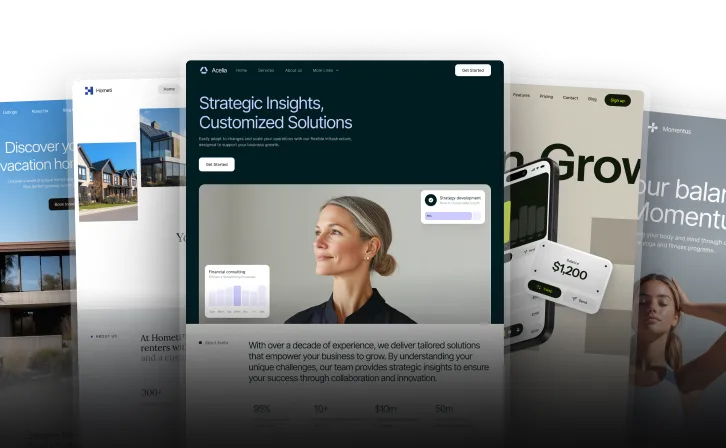Framer vs WordPress: Which Website Builder is Right for You
Unlock all templates




Framer and WordPress are two popular website builders, each catering to different needs. Here's a quick breakdown to help you decide:
- Framer: Best for designers and creatives who want visually stunning, interactive websites without coding. It's ideal for portfolios, SaaS landing pages, and design-focused projects.
- WordPress: Perfect for bloggers, businesses, and e-commerce sites needing scalability, flexibility, and advanced content management tools. It's supported by a vast library of plugins and themes.
Quick Comparison
| Feature | Framer | WordPress |
|---|---|---|
| Design Approach | Visual-first, freeform canvas | Theme-based with customization |
| Ease of Use | Simple drag-and-drop interface | Steeper learning curve |
| Hosting | Built-in AWS hosting | Requires external hosting |
| Customization | Limited to design-focused tools | Extensive plugins and themes |
| Best For | Portfolios, SaaS, creative sites | Blogs, e-commerce, content-heavy sites |
Choose Framer if you prioritize design and simplicity.
Go with WordPress if you need flexibility, scalability, or a strong CMS.
Now, let’s explore how they compare in detail.
Framer vs Webflow vs WordPress 2025: Which Website Builder Is The Best?

Setup and Learning Process
Framer's Design Interface
Framer uses a drag-and-drop system that enables designers to create websites without writing code. Its canvas allows users to arrange elements freely while still maintaining a polished look. To help users get up to speed, Framer University provides over 100 video lessons and 346 pre-designed website resources.
"The road to no-code interface designing has been made easy with applications like Framer." - Nidhi B.
WordPress Setup Steps
Setting up WordPress depends on your hosting provider. Many popular hosts simplify the process significantly. Here's a quick comparison:
| Hosting Provider | Installation Process | Key Features |
|---|---|---|
| Bluehost | Automatically installs during signup | Easy admin access through the dashboard |
| SiteGround | One-click install via the hosting panel | Offers optional extras during setup |
| WP Engine | Comes pre-installed with account creation | Tailored WordPress environment |
Most users opt for managed hosting, which handles the technical setup for them. These options mean the setup experience can vary widely, influencing how quickly users can start building.
Learning Curve Comparison
Framer is designed for speed and simplicity, making it easy for users to create websites with little technical knowledge. On the other hand, WordPress offers a more customizable experience with its vast plugin options, but this comes with a steeper learning curve.
"I think there's no one teaching Framer as good as you." - Nayat Cheikh, Head of Product Design @ Maple
For those who want quick, professional results, Framer’s visual interface is a great choice. Meanwhile, WordPress appeals to users ready to invest time in mastering its tools to unlock deeper customization.
Design Tools and Options
Framer Design Features
Framer provides a visually-driven interface tailored for building dynamic websites. It's particularly strong in animations, enabling designers to craft interactive elements with ease. Its direct integration with Figma simplifies the process of transforming static designs into interactive layouts.
Some standout features include:
- A visual interface for creating animations
- Pre-made components and modules
- Real-time previews for instant feedback
- Built-in tools for responsive design
On the other hand, WordPress takes a different approach, offering a vast ecosystem of themes and plugins to support a wide range of design needs.
WordPress Theme System
WordPress focuses on deep customization through its extensive theme system. It caters to users with varying skills, from beginners using visual page builders to advanced developers modifying code. As of 2023, WordPress powers nearly 44% of all websites.
| Customization Level | WordPress Features | Implementation Method |
|---|---|---|
| Basic | Block Editor | Visual interface with pre-designed blocks |
| Intermediate | Page Builders | Drag-and-drop tools with advanced styling |
| Advanced | Theme Customization | Direct PHP and CSS modifications |
| Expert | Custom Development | Full-stack development with API integration |
Design Features Chart
Here’s a side-by-side comparison of the design capabilities offered by Framer and WordPress:
| Feature | Framer | WordPress |
|---|---|---|
| Visual Editor | Modern drag-and-drop interface | Block editor with page builder options |
| Component Library | Focused, limited selection | Extensive themes and plugins ecosystem |
| Animation Tools | Built-in advanced animations | Relies on plugins, capabilities vary |
| Responsive Design | Automatic responsive layouts | Customizable, depends on the theme |
| Design Freedom | Geared toward modern interfaces | Broad, with expertise required for full use |
While WordPress offers greater flexibility and customization, it often demands more technical know-how. For projects that require intricate customization, WordPress is a strong option. Framer, however, shines for designers aiming to create sleek, interactive designs without diving into complex development.
sbb-itb-fdf3c56
Speed and Growth Potential
Framer Hosting System
Framer's hosting is powered by AWS CloudFront, S3, and globally load-balanced frontends with large in-memory caches. This setup ensures quick load times and smooth performance for users. Every site on Framer is automatically pre-rendered, including responsive versions, which improves both loading speed and SEO. Recent updates have significantly enhanced page hydration, speeding it up by 50–80% on standard devices and up to 200% on slower ones. Additionally, compressed caching can double the load speed for larger sites. In comparison, WordPress relies heavily on external hosting providers for similar optimizations.
WordPress Hosting Options
The performance of WordPress sites varies depending on the hosting provider and the level of optimization applied. WordPress.org suggests several hosting providers, each offering different features and performance outcomes. According to CNET reviews, some of the top-rated WordPress hosting options include:
| Host | Rating | Strengths | Limitations |
|---|---|---|---|
| Hostinger | 8.6/10 | Guided installation, AI tools, automated backups | Support limited to live chat |
| SiteGround | 8.3/10 | Auto-updates, daily backups, strong support | Limited storage, high renewal costs |
| A2 Hosting | 8.3/10 | NVMe storage, LiteSpeed servers | Inconsistent customer service |
To achieve the best performance, WordPress site owners need to regularly clean up their databases, optimize plugins, use a CDN, compress images, and fine-tune JavaScript and CSS files. These steps are essential for scalability and delivering a seamless user experience.
Speed and Traffic Chart
Here's a comparison of key performance features between Framer and WordPress:
| Feature | Framer | WordPress |
|---|---|---|
| Global CDN | Built-in AWS CloudFront | Requires separate setup |
| Image Optimization | Automatic | Manual or plugin-based |
| Traffic Handling | Load-balanced across global servers | Depends on hosting plan |
| Deployment Speed | Sub-second global deployment | Varies by host |
| Content Caching | Automatic with in-memory caching | Requires configuration |
| Performance Optimization | Built-in | Manual setup needed |
"Framer's hosting infrastructure is built for simplicity, performance, and reliability, powered by Amazon Web Services (AWS) with CloudFront, S3, and globally load-balanced frontends featuring large in-memory caches." - Framer Help
Best Uses by Industry
Framer Website Types
Framer is perfect for visually striking and interactive websites, making it a go-to choice for:
- Design portfolios
- SaaS landing pages
- Creative agency sites
- Product launches
Its no-code process is ideal for teams that focus heavily on visual design and aesthetics.
WordPress Website Types
WordPress shines with its flexibility and extensive plugin options, making it an excellent choice for:
- E-commerce stores: WooCommerce integration supports seamless online retail operations.
- Content-heavy websites: Its strong CMS capabilities handle large amounts of content effectively.
According to WP Engine, WordPress e-commerce sites can achieve up to 40% faster loading speeds and see an 18% boost in sales when optimized with WooCommerce.
Industry Match Chart
| Industry | Best Platform | Key Advantages |
|---|---|---|
| Design & Creative | Framer | Freeform canvas, advanced animations, design-first focus |
| E-commerce | WordPress | Over 1,200 e-commerce templates, WooCommerce integration |
| SaaS Companies | Framer | Interactive prototypes, quick deployment |
| Content Publishers | WordPress | Extensive CMS tools, 8,000+ themes |
| Digital Agencies | Either | Framer for design focus; WordPress for full-service needs |
| Personal Portfolios | Framer | No-code animations, user-friendly interface |
"Framer Commerce gave our team the creative freedom and flexibility to design our site in Framer while leveraging the power of Shopify. This allowed us to spend more time designing and crafting the site, knowing the rest was taken care of. The support was top notch and very responsive to our questions. We wouldn't have been able to launch our store without them. Would 1000% recommend Framer Commerce." - Gunnar Grey, Design Lead at Perplexity
For industries that need extensive customization, WordPress offers over 8,000 themes and countless plugins. On the other hand, Framer’s design-first approach is better suited for businesses focused on creating visually engaging and interactive experiences.
Conclusion: Making Your Choice
Main Points Review
Here's a quick recap of the standout features:
WordPress powers an impressive 43.4% of websites. Its massive plugin library and powerful CMS make it ideal for content-heavy sites and e-commerce businesses.
Framer boasts a 4.5 out of 5 stars rating, thanks to its design-first tools. It's perfect for professionals needing advanced prototyping, animations, and interactive features.
Platform Selection Guide
Deciding which platform to use depends on your specific needs. Here's how they stack up:
Go with WordPress if you need:
- Full e-commerce functionality through WooCommerce
- Advanced content management tools
- Tons of customization options with themes and plugins
- Affordable hosting starting at just $5 per month
Choose Framer if you need:
- Sophisticated prototyping and animation tools
- A sleek, AI-driven design interface
- Fast project launches for design-centric sites
- Minimal coding to streamline your workflow
"If you want a business website that does everything you want it to do and doesn't require custom coding, WordPress is awesome." - GoDaddy Blog
| Business Need | Recommended Platform | Why It Works |
|---|---|---|
| Content Publishing | WordPress | Excellent CMS and SEO-friendly structure |
| Design Portfolio | Framer | Top-notch animation tools and visual focus |
| Online Store | WordPress | WooCommerce and flexible payment options |
| SaaS Landing Page | Framer | Interactive designs and quick deployment |
| Multi-purpose Site | WordPress | Scalable, backed by 63% of the CMS market |
WordPress thrives with its extensive ecosystem, while Framer stands out for its visual and interactive strengths. Match your choice to your goals and technical requirements.
Related Blog Posts
Recommended posts
Unlock all templates







